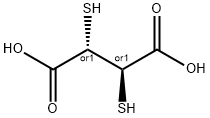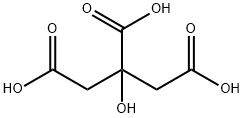A3171012
meso-2,3-Dimercaptosuccinic acid , 98% , 304-55-2
Synonym(s):
2,3-Dithio-meso-tartaric acid;DIM-SA;DMS;DMSA;Succimer
CAS NO.:304-55-2
Empirical Formula: C4H6O4S2
Molecular Weight: 182.22
MDL number: MFCD00064799
EINECS: 206-155-2
| Pack Size | Price | Stock | Quantity |
| 1G | RMB29.60 | In Stock |
|
| 5G | RMB97.60 | In Stock |
|
| 25G | RMB376.00 | In Stock |
|
| 100G | RMB1204.00 | In Stock |
|
| others | Enquire |
Update time: 2022-07-08
PRODUCT Properties
| Melting point: | 196-198 °C (dec.)(lit.) |
| Boiling point: | 285.62°C (rough estimate) |
| Density | 1.439 (estimate) |
| refractive index | 1.5220 (estimate) |
| storage temp. | -20°C |
| solubility | DMSO (Sparingly), Methanol (Slightly, Heated) |
| pka | pK1:2.71;pK2:3.48;pK3:8.89(SH);pK4:10.79(SH) (25°C) |
| form | Powder |
| color | White to off-white |
| Water Solubility | Soluble in water, and ethanol (25 mg/ml, results in colorless to light yellow, clear). |
| Merck | 14,8865 |
| BRN | 1725150 |
| Stability: | Stable. Combustible. Incompatible with strong oxidizing agents. |
| InChIKey | ACTRVOBWPAIOHC-XIXRPRMCSA-N |
| CAS DataBase Reference | 304-55-2(CAS DataBase Reference) |
| EPA Substance Registry System | Butanedioic acid, 2,3-dimercapto-, (2R,3S)-rel- (304-55-2) |
Description and Uses
Succimer is a newly available oral chelator of lead and other heavy metals. The compound is indicated for the treatment of lead poisoning in children. Succimer does not bind iron, calcium or magnesium and preferentially binds lead, mercury and arsenic over copper or zinc. The metal-bound succimer is excreted in the urine. The drug may also be effective in adults.
chelating agent, antihypertensive
Safety
| Symbol(GHS) |   GHS07,GHS08 |
| Signal word | Warning |
| Hazard statements | H315-H319-H335-H361 |
| Precautionary statements | P201-P261-P280-P305+P351+P338-P405-P501a |
| Hazard Codes | Xi |
| Risk Statements | 36/37/38 |
| Safety Statements | 24/25-36-26 |
| WGK Germany | 2 |
| RTECS | WM7650000 |
| F | 10-23 |
| TSCA | Yes |
| HS Code | 29309090 |
| Hazardous Substances Data | 304-55-2(Hazardous Substances Data) |
| Toxicity | LD50 i.p. in mice: >3000 mg/kg (Friedheim, Corvi) |


